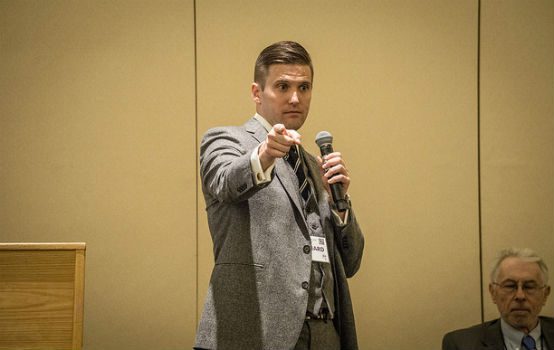Shutting Up Richard Spencer

Certain things used to be more, well, self-evident. A great many of us didn’t necessarily like that the First Amendment protected speech we disagreed with, or that even made us afraid, but we accepted it. An agreed-upon duty to protect the right to expression irrespective of its content existed, and we knew ensuring that liberty was not the same as endorsing what might be said with it. We understood that if we allowed government and other institutions to block one person’s speech they would block others’—right up until they came for us.
Then in November 2016 came a collective mental breakdown. An almost organic sense that overnight America had set itself on the path to fascism set in, and became justification for the weakening of the First Amendment. Free speech is now seen by many as a liability, an enabling tool for anyone labeled a “Nazi.” Some 69 percent of American college students believe hate speech (“using language on campus intentionally offensive to certain groups”) should be banned by the government.
Over now to The Ohio State University, which has refused to allow white supremacist Richard Spencer to speak on campus (Penn State has also turned him down). Ohio State, now being sued for violating the First Amendment, said Spencer would pose a “substantial risk to public safety, as well as material and substantial disruption to the work and discipline of the University.” They were no doubt also thinking of the $600,000 the University of Florida spent on security for Spencer’s recent appearance there, which included hundreds of police officers from five jurisdictions, as well as SWAT teams and snipers.
It’s easy to understand where Ohio State is coming from. Institutions have an obligation to public safety—but that must be balanced against the greater right to free speech, and the answer is rarely to ban expression outright simply to maintain order. A landmark Sixth Circuit Court of Appeals ruling from 2015 provides clear guidance:
When a peaceful speaker, whose message is constitutionally protected, is confronted by a hostile crowd, the state may not silence the speaker as an expedient alternative to containing or snuffing out the lawless behavior of the rioting individuals. Nor can an officer sit idly on the sidelines — watching as the crowd imposes, through violence, a tyrannical majoritarian rule — only later to claim that the speaker’s removal was necessary for his or her own protection. Uncontrolled official suppression of the privilege [of free speech] cannot be made a substitute for the duty to maintain order in connection with the exercise of that right.
That case involved a group called the Bible Believers, whose members used racially and religiously offensive language at a Dearborn, Michigan gathering of Muslims, even going as far as displaying a pig’s head on a stick. And the belief that law enforcement—or any institution—can opt first to shut down speech that requires physical protection has failed other courts’ tests, too, involving groups that ranged from Occupy to protesters outside of abortion clinics. In each case, the courts found alternatives that balanced the First Amendment and public safety far short of simply shutting down the event or chasing off the speaker.
In most contested cases security problems are not created by the speaker per se; they are created by the people opposing the speaker. A historian lecturing across campus from Richard Spencer on Babylonian art, for example, needs no police presence in the same sense that the full force of the First Amendment is not called on to protect the content of that historian’s speech. It’s controversial speech that requires protection, and for an institution to pretend otherwise essentially affords a protesting mob veto power over a speaker. The costs involved in security for someone like Richard Spencer are the price of protecting the First Amendment in broad practice, not simply for one person. Freedom, it seems, really isn’t cost-free.
I spent four years as an undergrad at Ohio State in the 1980s, and saw first-hand how the university can protect the free speech rights of a diverse group of speakers. During that time, a former member of the Black Panther party spoke in favor of racial violence. There were fights for LGBTQ and other rights. I saw massive police turnouts to protect gays marching across campus and for a women’s “Take Back the Night” march through rough neighborhoods. Iranian students massed for anti-American demonstrations while U.S. diplomats were being held hostage in Tehran. In each instance, Ohio State provided adequate security to allow both the speaker and any protesters to exercise their First Amendment rights while ensuring the safety of onlookers.
Even today, Ohio State on every other Saturday in the fall deploys a massive security presence for home football games where attendance can number above 100,000, multiples past the size of any protest that might confront Spencer. Crowds likely to cause hardship to passersby are well-advertised, and students know to avoid them if they wish. Many such events have already created the same “material and substantial disruption to the work and discipline of the University” that Ohio State fears Spencer will bring, but were allowed anyway.
The university already has a template to follow: last fall’s speech by alt-right controversialist Milo Yiannopoulos, which went smoothly. Ohio State can do it: they just want to be able to pick and choose when they do it. And that is wrong. An institution cannot cite avoiding public disruption as the initial or sole reason to restrict speech. The problems of having Richard Spencer—or anyone—speak on campus are outweighed by the obligation to protect the First Amendment right to free expression.
It’s pretty much self-evident.
Peter Van Buren, a 24-year State Department veteran, is the author of We Meant Well: How I Helped Lose the Battle for the Hearts and Minds of the Iraqi People and Hooper’s War: A Novel of WWII Japan. Follow him on Twitter @WeMeantWell